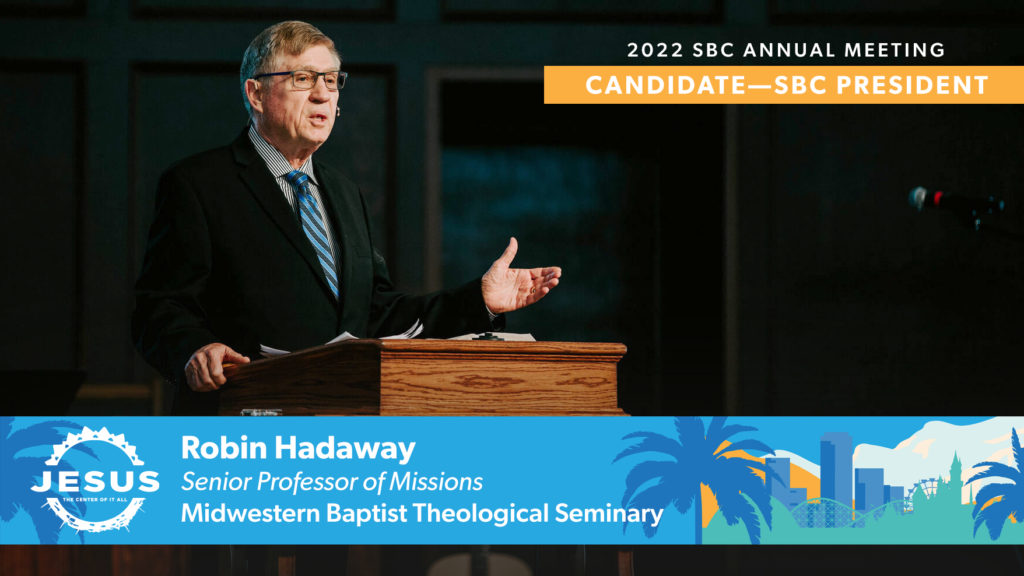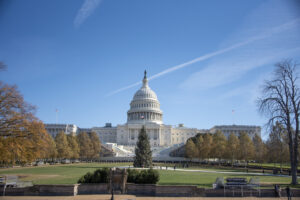
EDITOR’S NOTE: This essay from Robin Hadaway is published in conjunction with essays from Tom Ascol and Bart Barber. Ascol, Barber and Hadaway are the three known candidates to be nominated for SBC president at the 2022 SBC Annual Meeting in Anaheim, California.
Letters arrived in New England in 1813 with troubling news for two groups of churches. For Congregationalists, their new missionaries had resigned from their mission board, claiming now to be Baptists. On the other hand, Baptist churches in the United States were thrilled to hear Adoniram and Sarah Judson had joined their ranks, but there was no denomination, no mission board, no nothing, to support them.
In as hurried a manner as possible given the communications in 1814, Baptists in the USA organized what would become known as the Triennial Convention. The purpose of this new convention of churches was only to send and support home and foreign missionaries. Thirty-one years later, most of the Southern churches withdrew over the issue of slavery and states’ rights and formed a regional society, again, only to send and support home (NAMB) and foreign (IMB) missionaries. Baptists learned by partnering in missions churches could accomplish more in concert than by unilateral action. Later, Southern Baptists determined to collaborate in other joint efforts.
Southern Baptists desired an educated clergy, so the Southern Baptist Theological Seminary was founded in 1859, followed by SWBTS in 1908, NOBTS in 1917, GGBTS (Gateway) in 1944, SEBTS in 1950, and MBTS in 1957. We also value doctrinally sound church curriculum, so the Baptist Sunday School Board was created in 1863 (reestablished in Nashville in 1891). A group of women concerned about the waning focus on missions in the SBC, independently formed the Woman’s Missionary Union in 1888. Not only would the WMU support missionaries in prayer and purse but would also educate multiple generations of children to carry out the Great Commission Task. The Baptist Brotherhood Commission (1907) emerged as the counterpart of the WMU for men and boys, merging with NAMB in the year 2000.
In 1913, Southern Baptists finally turned to addressing the cultural issues of the day, creating the Social Services Commission, which was renamed the Christian Life Commission to make SBC churches aware of the “ethical implications of the Christian gospel.” In 2000 the CLC was renamed again as the ERLC. The pressing needs of that day were Anarchism, Marxism, Evolution, Prohibition, Women’s Suffrage, neglect of the Sabbath, and racism in the Jim Crow South. In 1917 the demands to address the needs of a growing denomination required the creation of a new entity – the Executive Committee – to administer the denomination between annual meetings.
The cultural, social, and political issues of the day galvanize every generation that faces them. Every issue must be addressed by Christians to some extent. This is good and right. Jesus said in John 15:19 “If you were of the world, the world would love its own; but because you are not of the world, because of this the world hates you.” In His high priestly prayer, Jesus said about His church in John 17:15-18, “I do not ask You to take them out of the world, but to keep them from the evil one. They are not of the world, even as I am not of the world. Sanctify them in truth; Your word is truth. As You sent them into the world, I also have sent them into the world.” Although Jesus was speaking to God the Father on behalf of His disciples, our Lord clarifies that His prayer would include us. He continues in John 17:20-21, “I do not ask on behalf of these alone, but for those also who believe in Me through their word, that they may all be one; even as You, Father, are in Me and I in You, that they also may be in Us, so that the world may believe that You have sent Me.”
Although there’s a lot in these verses, a few truths stand out to me. (1) We are in “the world” but not of “the world” (2) Christians have been sent into “the world” (3) “The world” hates Christianity, Christians, and Christ (4) Christians are to be united. (5) Our unity is around the truth as found in God’s Word. (6) When we are one around God’s truth, “the world” will understand that God has sent Jesus into the world.
The SBC is not a “normal” denomination. Nobody is a Southern Baptist, there are only churches that choose to be in “friendly” cooperation with the Southern Baptist Convention. The SBC exists for only two days a year at its annual meeting. Any church can self-select at any time to join with Southern Baptists in their cooperative mission task or withdraw from us. The Convention can do the same if a church conducts itself in opposition to the Baptist Faith and Message 2000. As many have said, the SBC is a “rope of sand.” The SBC owns no property except the Baptist building in Nashville. The churches of the SBC are independent, autonomous and accountable only to Jesus and themselves.
All of the “in the world” cultural issues deserve an SBC response. Our Convention rejoins in the form of resolutions at the annual meetings and declarations from entities created for the purposes of responding to the issues of the day. We should not be surprised, however, when “the world” does not like our point of view. But again, the resolutions we pass at the annual meetings are non-binding, as are the actions of our various entities and officers. The power in our family of churches is our zeal for giving to mission causes. When that wanes, then so will our influence, membership and number of churches.
As we respond to our cultural, societal, educational, and benevolent responsibilities, let us not forget our original task. The primary responsibility of the SBC is to support our North American Mission Board and our International Mission Board so the world will understand that God has sent Jesus into the world. Remember the Mission!














